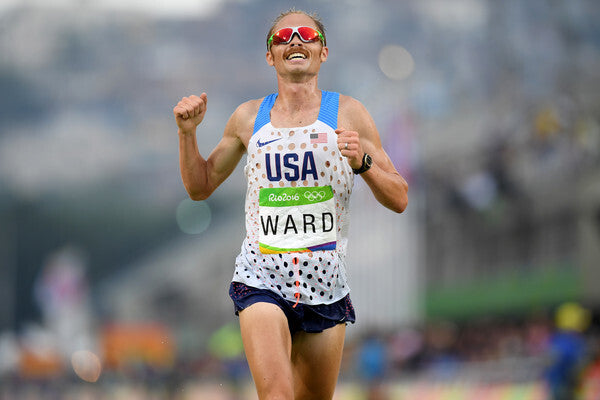5 tips to Quicker Recovery from Olympic Marathoner, Jared Ward

Early in my running career, I recall some life-changing advice from a running hero of mine: Meb Keflezighi. Are you ready for it? Meb advised me to be patient. Seem like kind of a let down? It seemed like that to me at the time too. I think I had hoped he would reveal some secret to marathon training that would make me as invincible to competition and age as he seemed to be. I wanted him to tell me what else I should be doing. But it seemed his seasoned advice was always, “Jared, be patient. There is plenty of time.” He told me this many times, and it didn’t seem to matter if the race was 4 years, 4 months, or 4 weeks away — it was the same advice: “Jared, be patient. There is plenty of time.”
For quite a while, I didn’t really believe him. I thought maybe we just had different definitions of patience. Then I started to think that maybe Meb could afford to be patient, but that I still needed to go force fitness right now. Now, I’m eating my words at least weekly as I offer my advice to young pros and new runners in general: be patient.
Gains happen when we rest. Exercise stresses our body, and our body reacts by building back stronger — if we give it time. Consistency is king in the long run. If we can stay healthy, then we can continue to make deposits to lifetime fitness, uninterrupted by burnout and injury. Endurance athletics is a long game. Former marathon world record holder Haile Gebrselassie was know to say that success in a marathon is a culmination of work done over the 4 years leading into the race. That’s a lot of time to think about training for one race! I think that we are often training for many upcoming races at the same time.
But patience is just one half the equation, work is necessary too. And no ambitious athlete wants to shortchange his or her potential. However, I’m guessing if you are reading this you are likely in the ambitious camp. So I offer 5 tips to speeding up recovery from your ambitious training with the goal of helping you achieve your potential, but keep in mind that my preliminary advice is: be patient.
- Warm-up Properly
You’re warm-up is more likely to affect how your muscles recover than your cool down. Vibration therapy has been a part of my warmup routine for many years now. I’ve found particularly that as I give some time to loosen my glute muscles and external rotators that I move a lot more smoothly. And the better movement also translates to recovering quicker after a workout session.
- Fuel Within 30 mins of Exercise
Fueling immediately after exercise has made a huge difference in how I feel when headed out to a subsequent training session. This was something I picked up in college and one thing I don’t compromise on. There is likely a good, better, best with fuel — and I aim to get some natural fuel high in carbohydrate, and maybe a little protein — but almost anything is better than nothing. I try to get at least 200-300 calories within 30 mins, and a meal within 90 mins. I keep a stash of Honey Stinger waffles in my glove box as a tasty refuel option.
- Take protein at night
In a somewhat recent study it was shown that athletes taking protein at night had a higher concentration of amino acids in their blood the next morning, compared to those that did not. I picture those amino acids as little repair solders fixing my muscles. But I also have found that protein at night curbs my mid-night hunger, and I sleep better. Seems a win-win.
- Get plenty of sleep
Next, get plenty of sleep. Deep sleep is when the body secretes natural growth hormone. Cheaters dope with this stuff, so getting enough sleep and encouraging your body to secrete natural growth hormone can’t be a bad thing.
- Be Positive
Lastly, be positive. Nothing that kills a day, or a season, like coming down too hard on yourself. My sports psychologist at BYU (Craig Manning) would tell me I needed to come up with 3 things I did well before I could address 1 thing I was to do better next time, and I have found this to be a pretty good ratio. Identifying and reinforcing the things we do well fuels our confidence. And confidence is going to have us feeling better (read recovery) when we head out for our next training session.
See you on the trails!
Jared Ward




















































